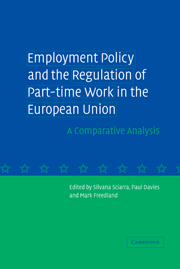Book contents
- Frontmatter
- Contents
- List of figures and tables
- Notes on contributors
- Preface
- List of abbreviations
- PART I
- PART II
- 4 France: part-time work – no longer an employment policy tool
- 5 Germany: part-time work – a bone of contention
- 6 Italy: adaptable employment and private autonomy in the Italian reform of part-time work
- 7 The Netherlands: from atypicality to typicality
- 8 Spain: the difficulty of marrying flexibility with security
- 9 Sweden: part-time work – welfare or unfair?
- 10 The United Kingdom: how is EU governance transformative?
- Index
7 - The Netherlands: from atypicality to typicality
Published online by Cambridge University Press: 30 July 2009
- Frontmatter
- Contents
- List of figures and tables
- Notes on contributors
- Preface
- List of abbreviations
- PART I
- PART II
- 4 France: part-time work – no longer an employment policy tool
- 5 Germany: part-time work – a bone of contention
- 6 Italy: adaptable employment and private autonomy in the Italian reform of part-time work
- 7 The Netherlands: from atypicality to typicality
- 8 Spain: the difficulty of marrying flexibility with security
- 9 Sweden: part-time work – welfare or unfair?
- 10 The United Kingdom: how is EU governance transformative?
- Index
Summary
Introduction
In 2000 the European Council in Lisbon agreed to set targets concerning employment–population ratios. The EU target for 2010 is 70 per cent, meaning that seven out of ten people in the working age (15–64) population should be employed. The current figure for the Netherlands is 74 per cent, which ranks the country in third place, after Denmark and Sweden. Figure 7.1 shows that this was the result of above-average employment growth during the 1990s. Employment growth owed much to the rapid spread of part-time jobs. If employment is recalculated in Full-time Equivalent jobs, the employment record of the Netherlands is more modest. The full-time employment ratio would be just over 60 per cent, compared with 51 per cent for the EU as a whole, far short of the Lisbon target. An important feature of the Dutch labour market is the prevalence of part-time and temporary work. Figure 7.2 shows the share of part-time employment in the workforce as a whole. We see a remarkable difference between the Netherlands and the EU average. In the Netherlands almost 40 per cent of the employed labour force works part-time, while the figure for the European Union as a whole is less than 20 per cent. As Figures 7.1 and 7.2 show, part-time work is especially prevalent among women. An important issue is the reason why people work part-time.
- Type
- Chapter
- Information
- Employment Policy and the Regulation of Part-time Work in the European UnionA Comparative Analysis, pp. 190 - 223Publisher: Cambridge University PressPrint publication year: 2004
- 15
- Cited by



